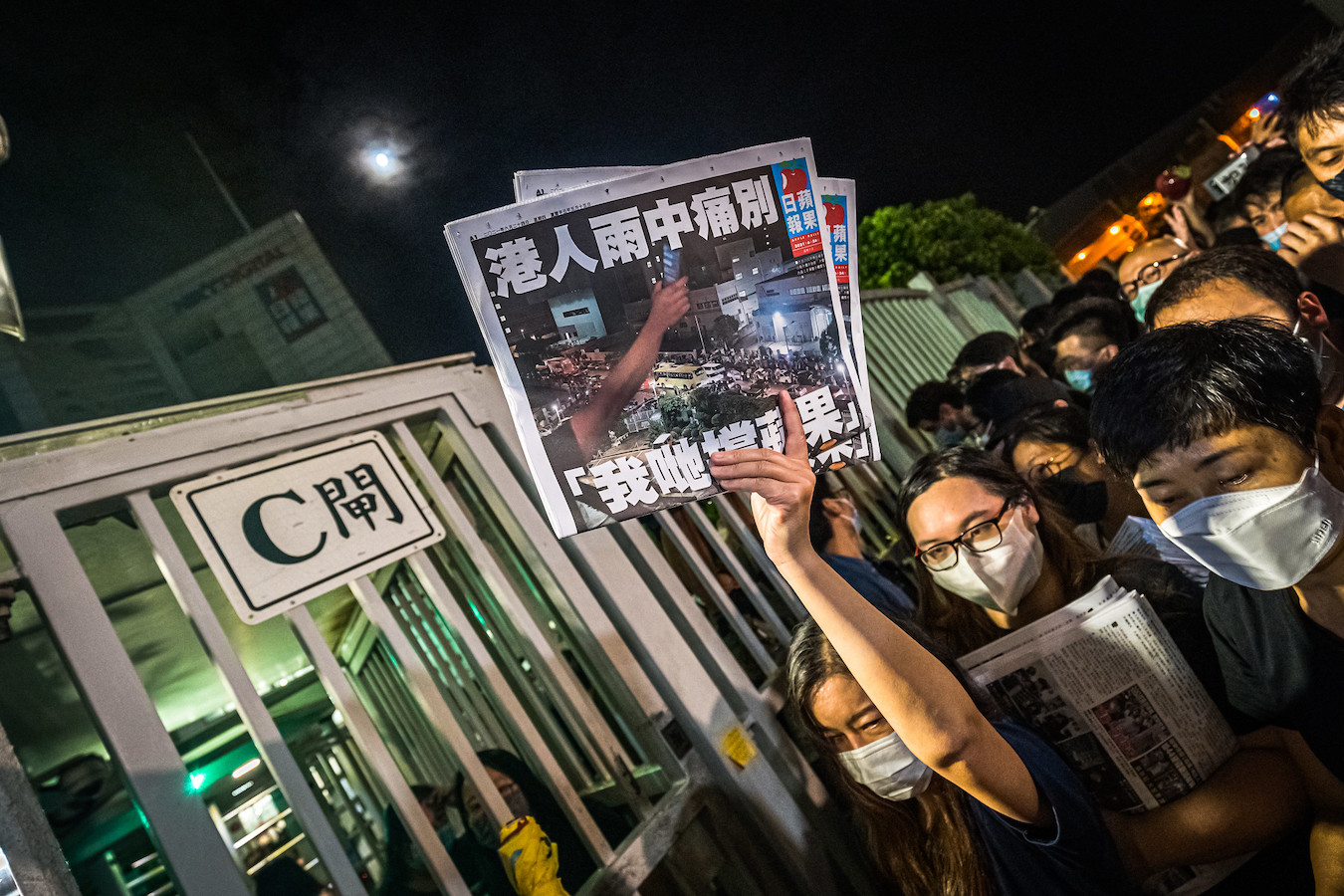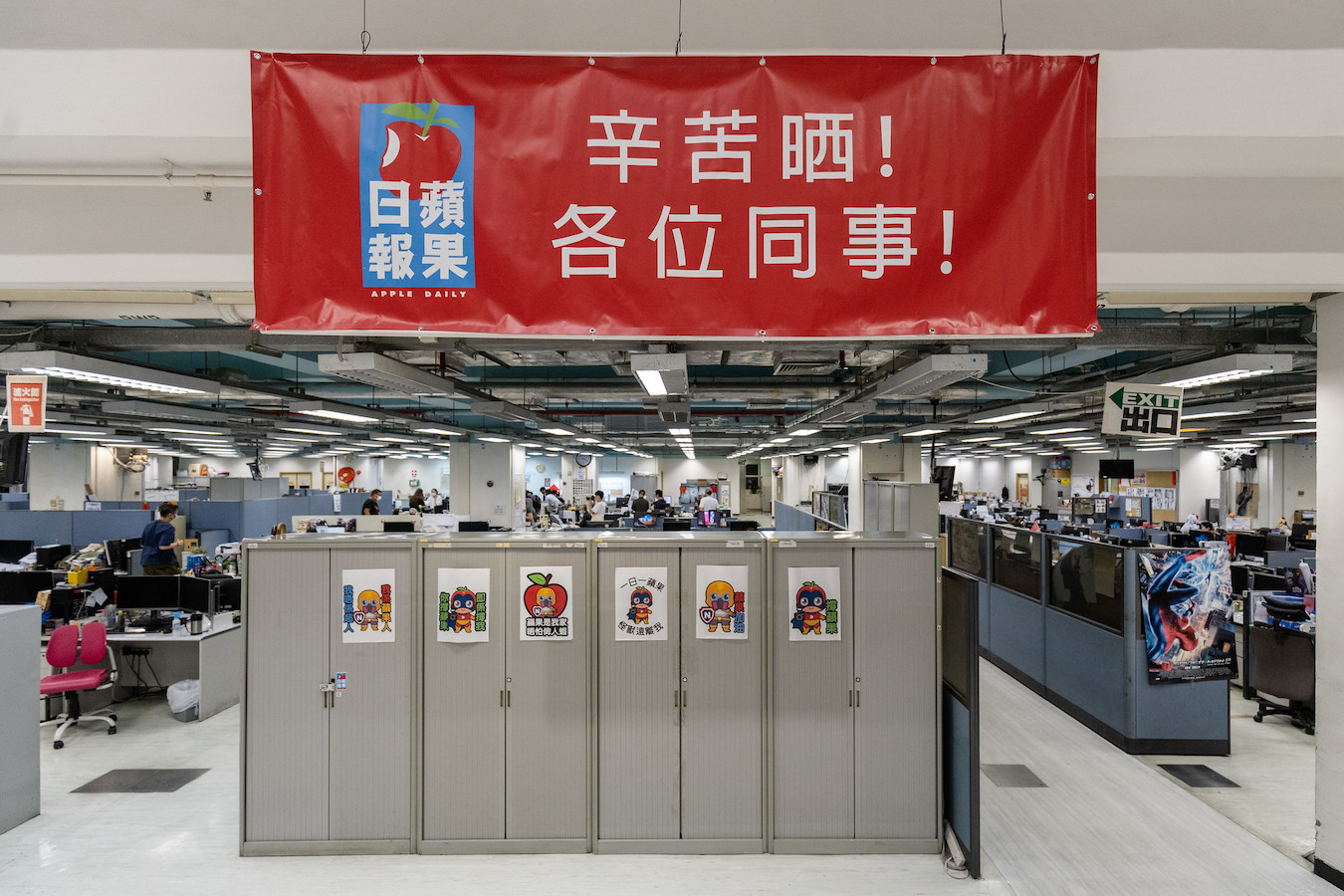by Brian Hioe
語言:
English
Photo Credit: Solomon203/WikiCommons/CC
REPORTS FROM Hong Kong’s Ming Pao and local media outlets suggest that the Apple Daily Taiwan has a buyer. This is reported as being Hong Kong businessman Kenny Wee and Singaporean 17LIVE co-founder Joseph Phua.
Details of the purchase are to be confirmed, as it has not been officially announced who purchased the media outlet. Though the Taipei Department of Labor has confirmed that the Apple Daily Taiwan has applied to lay off 280 employees, reportedly many of the online media outlet’s employees do not have details of the current situation. Previously, the Apple Daily Taiwan claimed it would be retaining most staff after the sale.
Although the Apple Daily shut down in June 2021, with the Taiwanese edition printing its last print edition the month prior, the Taiwanese online component of the publication has continued operating independently of the shutdown of its Hong Kong parent company.
 Supporters of the Apple Daily in Hong Kong on its last day of printing. Photo credit: Studio Incendo/Flickr/CC
Supporters of the Apple Daily in Hong Kong on its last day of printing. Photo credit: Studio Incendo/Flickr/CC
The fall of the pro-democracy tabloid proved a major blow to press freedom in Hong Kong, given that the newspaper published dissenting views and reporting on the narrative advanced by the Hong Kong government. This took place after the imprisonment of owner Jimmy Lai, a media tycoon, the freezing of the newspaper’s assets, a police raid of the company headquarters that involved 500 police officers, and the arrest of media executives including the Apple Daily’s editor-in-chief, CEO, and chief operating officer. The Hong Kong government sought to frame the newspaper as colluding with external forces to try and incite foreign sanctions against Hong Kong.
Previously, concerns had been raised about who the buyer of the Apple Daily Taiwan might be, with fears that the Apple Daily Taiwan may be purchased by individuals hoping to advance pro-unification views in Taiwan. This has long been a concern in the media sector in Taiwan, such as with the Anti-Media Monopoly Movement in 2012, prompted by concerns about press freedoms in Taiwan after the purchase of the China Times and China Network Systems by Want Want Group owner Tsai Eng-meng. Tsai made no secret that his interest in purchasing Taiwanese newspapers and television outlets was to advance positive views of China in Taiwan.
The Economic Democracy Union, which played a key role in the Anti-Media Monopoly Movement and subsequent movements such as the 2014 Sunflower Movement, previously warned about attempts by a Hong Kong liquidator to acquire the Apple Daily Taiwan’s assets. The Economic Democracy Union argued that Taiwan would be within its legal rights to ignore such acquisition attempts.
The Ministry of Culture subsequently ordered that Apple Daily refuse requests by Hong Kong authorities regarding financial and personal data and not transfer this across borders. The two liquidators appointed by the Hong Kong government have not been allowed to enter Taiwan.
Previously speculation was that wealthy Taiwanese independence advocate Koo Kwang-ming could have been involved, due to reports that he purchased Jimmy Lai’s villa on Yangmingshan in Taipei last year in a transaction that possibly took place entirely in cash.
But to this extent, reports of Apple Daily Taiwan’s acquisition take place in a time of anxiety that the Chinese government may seek to acquire Taiwanese companies through proxies, such as through Singaporean or Hong Kong capital. Likewise, there have been fears of Chinese investment from individuals posing as Hongkongers, or acting as Hongkongers raised by pan-Green politicians. While Wee’s background is in the catering industry and later transitioned to media, Phua’s background may lead to some fears. There have generally been concerns in past years that livestreaming platforms such as 17LIVE may prove an effective means of propagating Chinese disinformation in Taiwan.
Nevertheless, the Economic Democracy Union has taken issue with reports of the acquisition, with convener Lai Chung-chiang filing for an investigation into breaches of the Personal Data Protection Act by Apple Online CEO Wu Yu-ai and CFO Johnny Chern. Concerns have been raised about the private information of Apple Daily workers or contributors, which include Hongkongers, Chinese, and other sensitive individuals, some of whom wrote under pseudonyms. It is feared that such information could end up in the hands of the Hong Kong government, and in this way be used to target these individuals.
 Apple Daily offices in Hong Kong on its last day of operation. Photo credit: Studio Incendo/Flickr/CC
Apple Daily offices in Hong Kong on its last day of operation. Photo credit: Studio Incendo/Flickr/CC
The Taiwan Statebuilding Party has joined in calls for further scrutiny of the Apple Daily Taiwan’s buyers, with the New Power Party previously calling for the sale to be blocked if it was to pro-China interests. For its part, the government has promised to strictly review Apple Daily buyers.
Lai has also raised questions about who authorized the sale, in consideration of questions about the current management structure of the Apple Daily Taiwan. Most Taiwanese media executives that were part of the organization have since resigned.
It is to be seen whether the Taiwanese government takes a firm stance on the issue, with the Tsai administration often downplaying issues that touch on Taiwan’s relation to Hong Kong as of late. At the same time, the issue is a pressing one for press freedoms in Taiwan, given the role that the Apple Daily Taiwan plays in Taiwan’s media landscape.

